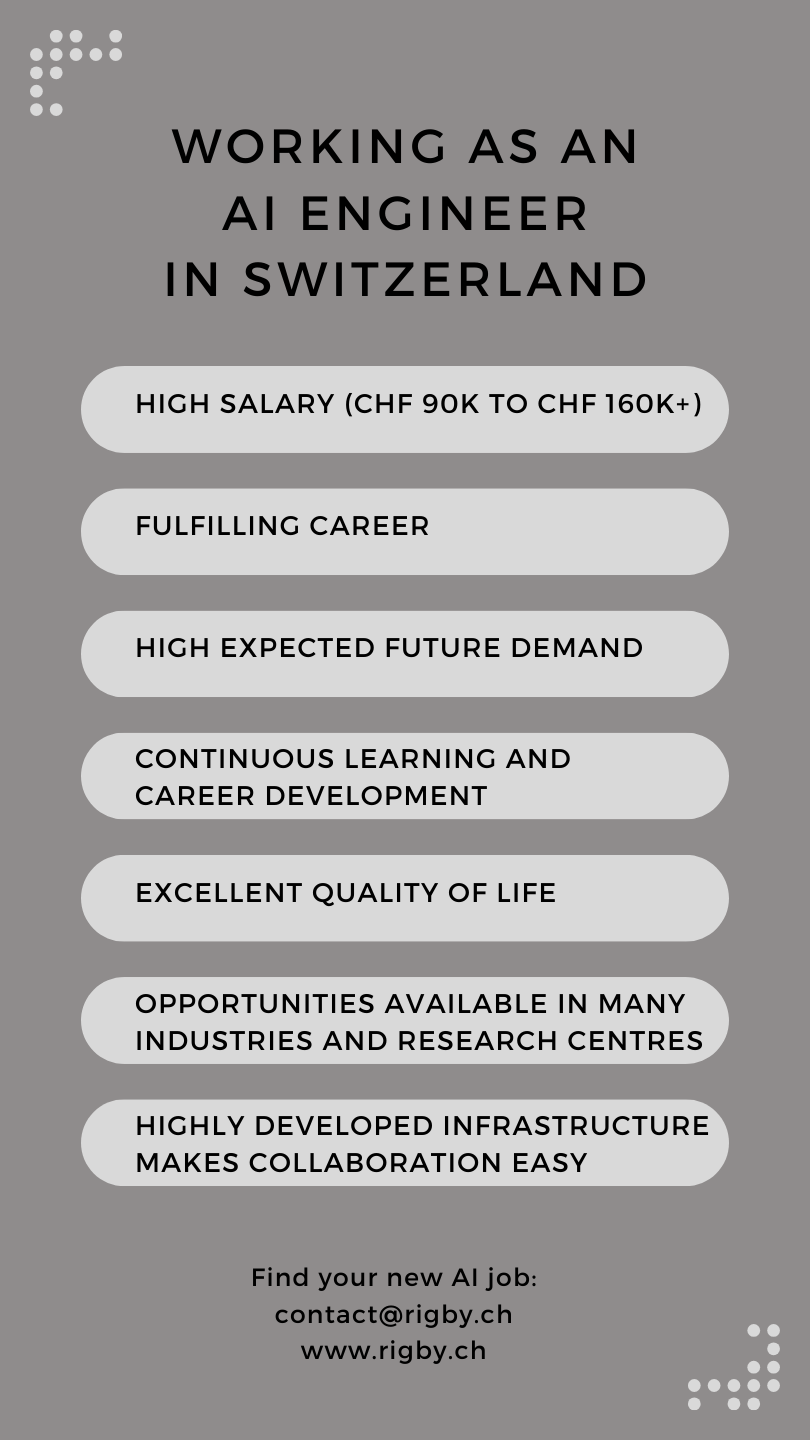Working as an AI Engineer in Switzerland
Located in the heart of Europe, Switzerland is known as one of the innovation capitals of the world. It is home to several artificial intelligence research centres as well as countless companies looking to implement AI solutions in the near future. Working as an AI engineer in Switzerland is a lucrative and rewarding career path.

What Does an AI Engineer Do?
AI engineers develop, program, and train artificial intelligence applications to perform tasks. They define the problems to be solved by AI models and develop an AI strategy for businesses or organizations. This role combines several disciplines such as programming, data science, data engineering, and software development.
What Qualifications and Skills Are Needed?
Most AI engineers have at least a Bachelor’s degree in an AI-related field such as IT, statistics, computer science, or data science. Many also have a Master’s degree in one of these areas. Candidates who want to stand out frequently enrol in additional certification programs. Andrew Ng’s courses are a great place to start, but there are many other options relevant to specific industries or aspects of AI.
The most important technical skills for AI engineers are:
- Mathematics: An in-depth understanding of calculus, algorithms, algebra, probability, and statistics is key.
- Programming languages: Many AI engineers understand programming languages like C++, R, Java, and Python.
- Natural language processing: This subfield combines linguistics with computer science. Its goal is to enable computers to use language in a natural and human way.
Additional skills relevant to many AI roles include:
- Clear communication
- Ability to work in a team with data or research analysts and software engineers
- Ability to collaborate with marketing managers and product teams
- Critical, creative, and analytical thinking
- Business acumen
- Relevant domain or industry knowledge
Why Choose a Career in AI?
AI is a booming industry, and the demand for engineers is set to skyrocket in the next decade. Currently, the Swiss AI market size is around US$4.24bn. It is projected to grow by almost 18% per year and is likely to reach $13.46bn by 2030. This means that machine learning and the development of AI models are valuable skills for the future. By building a career in this field now, you can become a highly sought-after employee, both in Switzerland and around the world.
Additionally, AI engineers benefit from high career satisfaction since they are solving real-world problems. Many engineers help businesses to improve their operations, increase revenue, and simplify processes. They work in diverse fields such as healthcare, education, web development, and banking. Since AI is rapidly evolving, engineers have to keep learning new concepts as they are developed. This makes the job engaging and varied. As an AI engineer, you’ll never get stuck in a routine, and you’ll have continuous opportunities for learning and career development.
Finally, this job can be lucrative, especially in a highly developed country like Switzerland. AI engineers benefit from high average salaries, which are set to grow in the future, as these professionals become increasingly indispensable.
Why Choose Switzerland?
Switzerland is a great destination for tech workers, who can benefit from the high quality of life, excellent working conditions, and diverse free-time activities. Due to staff shortages, there are currently countless vacancies in the IT industry. An increasing number of them are AI-related.
Switzerland’s geography lends itself to AI research because the country is small and well-connected. This makes it easy for research centres and organisations to collaborate, transfer technology, and bring innovative projects to market. Currently, some of the top research centres in Switzerland are Idiap Research Institute in Martigny, Valais, the Center for Artificial Intelligence in Medicine (CAIM) in Bern, the Center for Intelligent Systems (CIS) in Vaud, and the Dalle Molle Institute for Artificial Intelligence (IDSIA) in Lugano, Ticino.
It’s also worth mentioning that Swiss engineers and scientists often collaborate with others in neighbouring countries such as Germany or France. For example, the Zurich Institute of Technology (ETH Zurich) is creating a new research centre in Zurich and Heilbrunn, Germany.

What Jobs Are Currently Available?
In Switzerland, as in many other countries, the number of AI-related jobs is increasing rapidly. Although most roles are currently located in the greater Zurich area, other cities such as Lausanne are also emerging as artificial intelligence hubs.
In addition to engineers who develop and train AI models, companies will need experts who can teach their employees how to use AI, cybersecurity specialists, and data analysts with extensive knowledge of AI systems.
AI for Healthcare
AI engineers working in medicine might be expected to automate administrative tasks, improve dosage accuracy, develop less invasive surgeries using AI-enabled robots, develop virtual nursing assistants, and implement AI to recognize and prevent fraud. In Switzerland, there are numerous AI jobs in healthcare institutions and research centres focusing on medicine. Jobs related to drug discovery and medical research are often located in Basel since this is the home of many pharmaceutical companies like Novartis and Roche.
AI for Finance
In finance, AI can be used to personalize customers’ experiences, manage risk, prevent fraud, and enhance transparency and compliance. Many financial institutions located in Zurich and Geneva are looking for AI engineers. However, some jobs may be located in other cities such as Bern.
AI for Web Development
Increasingly, applications and webpages incorporate AI solutions to enhance efficiency or provide a better user experience. AI engineers working in web development might develop machine learning models such as chatbots or client tools and convert them into APIs. In Switzerland, many web development opportunities are located in the cantons of Zurich, Zug, and Bern.
AI for Businesses
AI has almost unlimited applications in business. Companies all over Switzerland are starting to use artificial intelligence systems to automate processes, enhance data analytics, improve marketing and sales efforts, provide a higher level of customer service, and enhance security. If you specialize in a particular industry such as manufacturing, education, commerce, or hospitality, speak to recruiters and check online for AI jobs in your field. You’ll almost certainly find suitable opportunities in various Swiss cities.
Job Application Tips
If you’re from an EU/EFTA country, you can enter Switzerland for up to six months to look for a job. However, it often makes sense to apply remotely and move to Switzerland once you’ve secured a job. Browsing online job portals is a good starting point, as it allows you to determine which positions could be a good fit for you. However, you might benefit from applying for jobs through a recruitment company. Swiss employers are sometimes more likely to consider candidates recommended to them by trusted recruiters. We at Rigby would be happy to discuss opportunities with you.
If you can’t find a job that suits your needs or you’d like to work for a specific company, send a spontaneous application. This is acceptable in Switzerland, and it demonstrates initiative.
Which Language Will I Need to Speak?
Most people in the eastern part of Switzerland speak German, and those in the western part speak French. A minority in the southern canton of Ticino is Italian-speaking. Although many AI engineer jobs are advertised in English, you have a bigger chance of being selected if you also have basic knowledge of German or French.
Aim for at least an A2 or B1 level, as this will allow you to communicate competently with your co-workers. If you study intensely, you may be able to reach this level within six to twelve months. With one or two classes a week, you’ll need to study for several years. Employers may be more likely to consider you if you’re actively learning the local language, even if you’re not fluent yet.
Salary Expectations
AI engineers working in Switzerland can expect higher-than-average salaries. Entry-level employees might earn around CHF 95,000, while more experienced engineers can expect between CHF 120,000 and 140,000. Those with excellent qualifications and several years of experience may earn upwards of CHF 160,000.
The AI industry is rapidly expanding, and Switzerland is home to research centres and large companies looking to incorporate AI in their operations. If you’re considering working as an AI engineer in Switzerland, apply now at Rigby AG. We’ll keep your CV on file and match you with suitable opportunities.